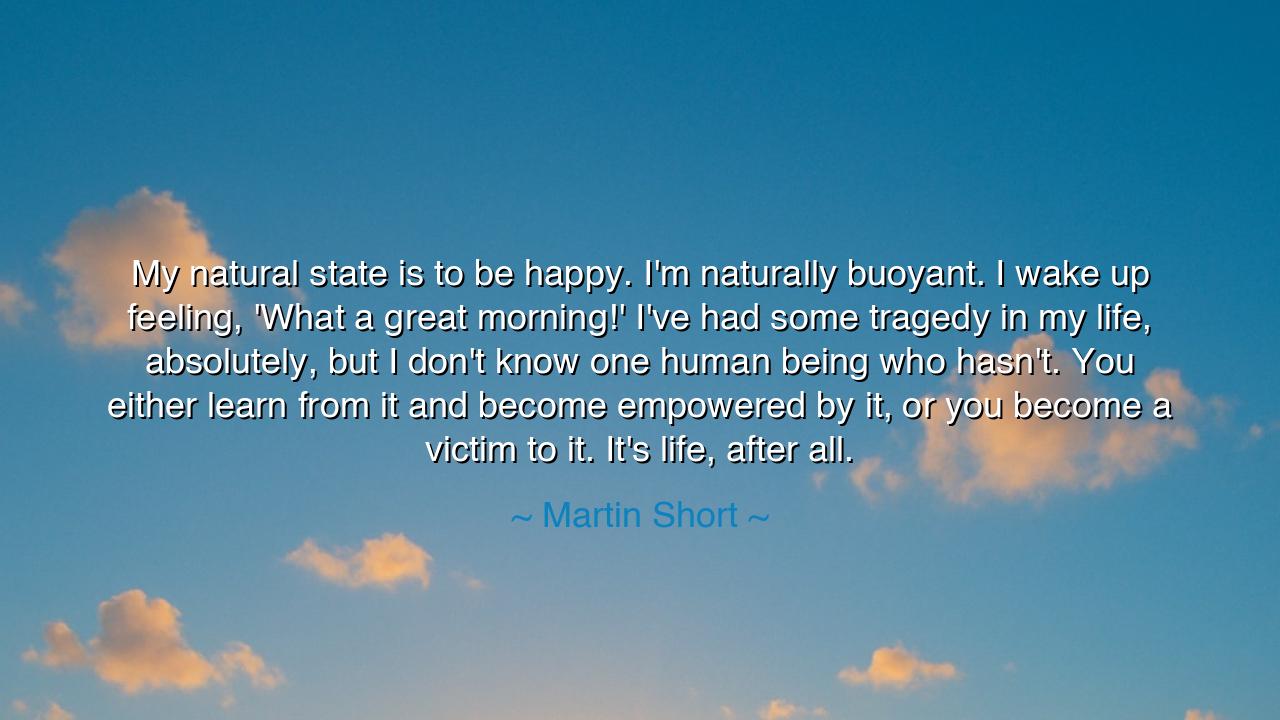
My natural state is to be happy. I'm naturally buoyant. I wake
My natural state is to be happy. I'm naturally buoyant. I wake up feeling, 'What a great morning!' I've had some tragedy in my life, absolutely, but I don't know one human being who hasn't. You either learn from it and become empowered by it, or you become a victim to it. It's life, after all.






The words of Martin Short carry within them a radiant truth, clothed in humility yet blazing with strength: “My natural state is to be happy. I’m naturally buoyant. I wake up feeling, ‘What a great morning!’ I’ve had some tragedy in my life, absolutely, but I don’t know one human being who hasn’t. You either learn from it and become empowered by it, or you become a victim to it. It’s life, after all.” These words remind us that happiness is not the absence of pain, but the triumph of the spirit over it. They teach us that the dawn can still be celebrated even when the night has been filled with sorrow.
To be buoyant is to rise when the waters of life threaten to drown us. The river of existence does not flow gently for all; it surges, it crashes, it floods. Yet there are those who, like Short, float upon its surface with laughter, refusing to sink. Such souls are not blind to tragedy, nor do they deny its sting. Rather, they choose to see beyond it, to declare each morning anew: “What a great day to live.” This is a discipline of the heart, an inner art known to sages of every age.
For in truth, no mortal escapes the shadow of grief. The ancients told us of Job, whose losses were vast, whose sorrow was unmeasured. Yet even he, sitting in ashes, found words to bless life. Likewise, history gives us the story of Nelson Mandela, who endured decades in prison, robbed of his youth, his freedom, his family’s presence. Yet he did not emerge broken. He rose, empowered by suffering, transformed into a beacon of reconciliation. Where another might have become a victim, Mandela became the father of a nation’s healing.
This is what Short proclaims: that pain is universal, but the response to pain is a choice. One may bow to it, carry it like a chain, and live forever in the identity of a victim. Or one may lift it, wrestle with it, and forge from it the weapon of wisdom and the shield of compassion. To learn from tragedy is to refuse its dominion; to rise empowered is to declare mastery over life’s cruelties.
The natural state of happiness is not naïve. It is courageous. It is the warrior’s stance before the storm, saying: “You may strike me, but I will rise.” To wake with joy, even after loss, is to honor both the living and the dead. It is to say that tragedy may shape us, but it does not own us. Life, after all, is not measured by what we suffer, but by what we do with that suffering.
The lesson here is mighty: each dawn is a choice. Will you awaken to bitterness, or will you awaken to the gift of breath and sky? Will you clutch tragedy as a shroud, or weave it into a banner of resilience? The path of wisdom is to embrace joy not because life is easy, but because joy itself is the most defiant answer to hardship. To be happy is to resist despair. To be buoyant is to show others that they, too, can rise.
Therefore, let each one of us cultivate this spirit. When sorrow visits, do not deny it, but do not worship it either. Learn from it, honor its lesson, and step forward empowered. Rise in the morning and say, with Martin Short, “What a great day!” even if yesterday was filled with tears. In so doing, you will not only free yourself, but you will also kindle light for all who walk beside you.
And so the wisdom stands eternal: Life is tragedy and joy entwined, shadow and sun forever dancing. But it is we who choose which to embrace. Choose empowerment. Choose happiness. For though pain is certain, so too is the resilience of the human spirit — and that, above all, is life.






AAdministratorAdministrator
Welcome, honored guests. Please leave a comment, we will respond soon